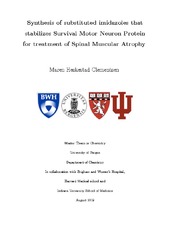Synthesis of substituted imidazoles that stabilizes Survival Motor Neuron Protein for treatment of Spinal Muscular Atrophy
Master thesis
Permanent lenke
https://hdl.handle.net/1956/20823Utgivelsesdato
2019-08-31Metadata
Vis full innførselSamlinger
- Department of Chemistry [442]
Sammendrag
Spinal muscular atrophy (SMA) is a common autosomal recessive disorder and the leading cause of infant mortality. Patients with this disorder are missing the SMN1 gene that is producing 80-90 % of the Spinal motor neuron (SMN) protein. The SMN2 gene is not able to produce the full-length protein, due to a small difference in the splicing pattern. This leads to loss of muscle function and physical disability. Different treatments ave been performed on patients with SMA, and one of them is to increase the SNM2 gene. In 2012 Androphy et al., in collaboration with Dr. Hodgetts at the LDDN, discovered two hit compounds that increase the SMN protein. Based on one of these compounds, the research group at LDDN optimized the molecule and produced a better probe for the treatment of SMA. In this project, the synthesized probe will be optimized by changing the heterocycle, with the same substituents and amide linker. Different synthesis has been performed, before reaching the target molecule. Amidation with acid chloride and an amine is the main reaction leading to the target molecule. In addition to the target molecule, different analogs have also been made. The substituents on the heterocycle and the amide linker have been modified, leading to several new compounds. All of the compounds that were synthesized, were also sent for testing at the Department of Dermatology, Indiana University School of Medicine. The main reason for the testing is to see if the compounds are active or not in the treatment for SMA. The % activation and the EC50 value for each compound in mouse models were determined. Based on the previously synthesized molecule, the target molecule was expected to be active. This turned out to be wrong, and the target molecule was inactive. However, one of the other compounds showed good activity.
